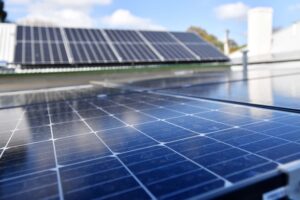Last week, I published a post on the point that the retail price of electricity in Germany has risen at the same time that whole electricity prices have dropped. Basically, utility profit margins in Germany have just gone up, and renewable energy has been used as a scapegoat for rising consumer energy prices.
One of our readers actually dropped a tremendously useful link in the comments, a link which included the graph below.
Now, as you can see, the graph is in German, but an explanation of it was translated for me by Google Translate, and I’ve stuck the key points in the caption below.
The green line above is the price of electricity on the German electricity exchange. The red line is the average price of electricity for households. The other lines are for commercial clients and special customers (notably, their prices have also risen).
I don’t think it gets much clearer, coinciding with the penetration of renewable energy on the German grid (and as it has moved away from nuclear power), there has been a drop in the wholesale price of electricity. But, for some reason (a rather obvious reason), those cost reductions have not been passed on to customers.
Funny that we should run across this at almost the same time as it has been revealed that Germany’s electricity grid also saw record reliability in 2011, at the same time as it saw a huge explosion in renewable energy on the grid — completely counter to countless anti–renewable energy claims shouted from the rooftops (er, on blogs, in major media, and in political forums).
Funny thing, isn’t it? The seemingly strongest (or at least most proliferated) arguments against renewable energy aren’t just wrong — they’re the opposite of what reality has now shown us.
![]() Clean Technica (http://s.tt/1nbqd)
Clean Technica (http://s.tt/1nbqd)








